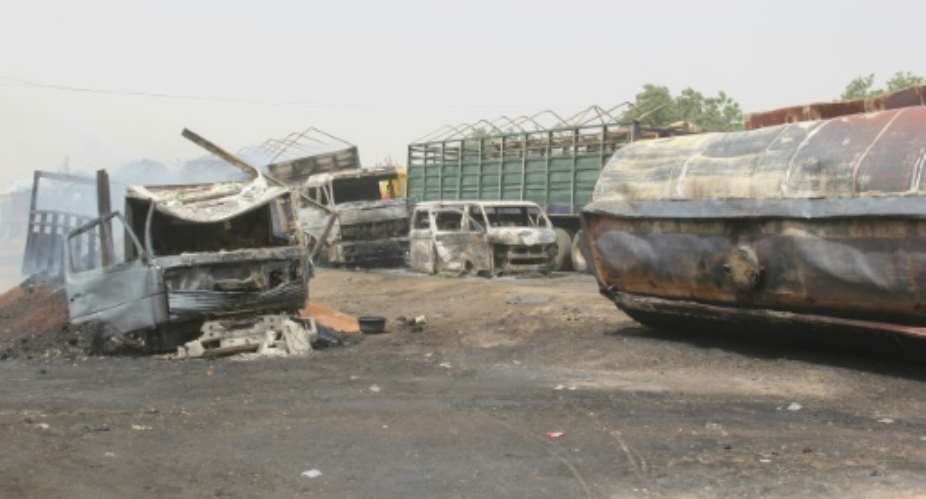The attacks were swift and brutal: fleeing villagers were gunned down or crushed under the wheels of trucks.
When the Islamist fighters left, dozens of mangled bodies lay scattered around.
People in northeast Nigeria are no strangers to horror after a decade-long jihadist insurgency that has seen thousands massacred and schoolgirls kidnapped.
But a flurry of bloody assaults last week has ramped up fears that a powerful jihadist faction may be opening a grim new chapter by extending its murderous attention from military to civilian targets.
Fighters of the Islamic State West Africa Province (ISWAP) splintered from the main Boko Haram group in 2016.
The rupture was in part over claims veteran leader Abubakar Shekau's campaign of suicide bombings against local Muslim residents was too cruel.
After pledging allegiance to the Islamic State group, the new faction sought to win support from communities by offering them rudimentary services.
The insurgents focused their attacks on the Nigerian military and other outside players -- killing hundreds of troops and abducting employees from international aid groups.
'Wounded lion'
Now the recent surge in killings -- which saw around 120 men, women and children butchered over just a few days -- has pushed some to see a turning point.
The bloodiest of the assaults came last Tuesday on the remote cattle-herding village of Felo.
Residents and officials said 81 people were either shot dead or run over by vehicles as they tried to escape.
Survivors said the attack was a targeted reprisal after locals, tired of the jihadists stealing their cattle, formed a local defence group and began killing ISWAP members.
"This was what led to the carnage on the herders," Babakura Kolo, head of another government-backed militia, told AFP.
Security sources and experts say the ferocity may be down to Nigerian army offensives that have piled pressure on the insurgents since April.
A regional security official said the operations -- which the military claims have killed 1,400 jihadists -- have no doubt "incensed the group".
"The Nigerian army often exaggerates the successes in its favour, but it is true that it has inflicted heavy casualties on ISWAP in recent months," said Bulama Bukarti, an analyst for sub-Saharan Africa at the Tony Blair Institute.
"And like a wounded old lion, ISWAP is reacting violently."
Leadership change
Feeding into the potential hardening of tactics is believed to be a change of ISWAP's leadership in a bloody internal purge last year.
Former head Idriss al-Barnawi was ousted and killed for being too "moderate" and replaced by a new shadowy figure known as Ba Lawan.
"This could be a fundamental turning point in the evolution of ISWAP," Bukarti said.
A source with deep knowledge of ISWAP's internal workings said the leadership was now "in the hands of more radical elements who see the local population as an enemy that should not be spared".
"They accuse villagers of passing information on them to the military and (anti-jihadist) militia," the source said.
"Ba Lawan and his lieutenants pursue the same extremely violent path that makes them no different from the same Boko Haram."
In fact the new commanders have even begun reaching out to the rival faction.
A meeting was held with Boko Haram emissaries in March where the foes "agreed to bury the hatchet and work together against their common enemy", the source said.
Vincent Foucher, an analyst at the International Crisis Group (ICG) think tank, said recent attacks "seemed to pursue specific objectives: to drive out the traitors, to multiply the tax receipts".
But it remained too early to tell if the group's strategy had changed definitively.
"If this trend continued then yes, we would be dealing with a major ideological development," he said.
"But for the moment, we rather have the impression that the violence is linked to the fact that the group is under pressure."
abu-cl/del/ri





 Former Kotoko Player George Asare elected SRC President at PUG Law Faculty
Former Kotoko Player George Asare elected SRC President at PUG Law Faculty
 2024 elections: Consider ‘dumsor’ when casting your votes; NPP deserves less — P...
2024 elections: Consider ‘dumsor’ when casting your votes; NPP deserves less — P...
 You have no grounds to call Mahama incompetent; you’ve failed — Prof. Marfo blas...
You have no grounds to call Mahama incompetent; you’ve failed — Prof. Marfo blas...
 2024 elections: NPP creates better policies for people like us; we’ll vote for B...
2024 elections: NPP creates better policies for people like us; we’ll vote for B...
 Don’t exchange your life for wealth; a sparkle of fire can be your end — Gender ...
Don’t exchange your life for wealth; a sparkle of fire can be your end — Gender ...
 Ghana’s newly installed Poland train reportedly involved in accident while on a ...
Ghana’s newly installed Poland train reportedly involved in accident while on a ...
 Chieftaincy disputes: Government imposes 4pm to 7am curfew on Sampa township
Chieftaincy disputes: Government imposes 4pm to 7am curfew on Sampa township
 Franklin Cudjoe fumes at unaccountable wasteful executive living large at the ex...
Franklin Cudjoe fumes at unaccountable wasteful executive living large at the ex...
 I'll 'stoop too low' for votes; I'm never moved by your propaganda — Oquaye Jnr ...
I'll 'stoop too low' for votes; I'm never moved by your propaganda — Oquaye Jnr ...
 Kumasi Thermal Plant commissioning: I pray God opens the eyes of leaders who don...
Kumasi Thermal Plant commissioning: I pray God opens the eyes of leaders who don...
